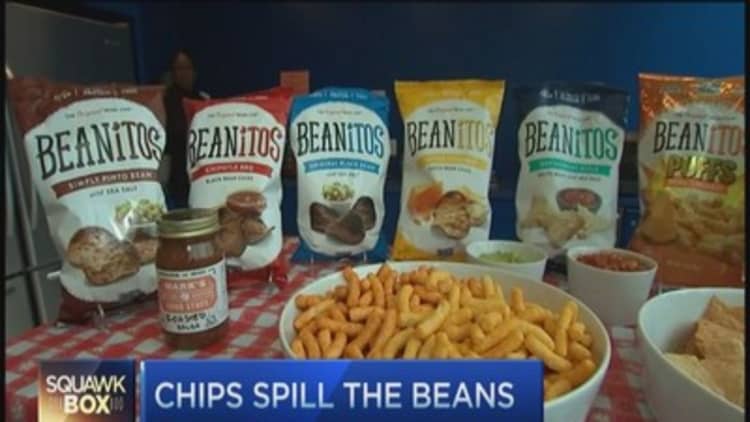Potato chip sales are struggling, and corn-based chips may be a gateway snack to obesity. Salty snacks are a $16 billion business, but Americans are increasingly looking for something healthier.
Like beans.

Beanitos are chips made from beans, the brainchild of Doug Foreman, who created Guiltless Gourmet.
"I like things that are high in protein," said Foreman. "When you try to find a snack that is high protein, there just wasn't anything out there."
Foreman and his brother started the company nearly five years ago after finally creating a chip based on beans that tastes almost exactly like a regular tortilla chip. Foreman took some of his chips to angel investors, who bit at the business proposal after taking a bite of the chips. Beanitos are now in 30,000 stores, including Whole Foods and Sprouts, and the company's newly created puffs are USDA-certified as a healthy snack for school lunch programs.
Read MoreMagic mushrooms found in queen's garden
"Things are lining up so that I think Americans and people around the world are going to have to start thinking about making better choices," said CEO Dan Costello, who used to work for the Frito-Lay unit of PepsiCo.
However, making bean-based snacks turned out to be very difficult.
"First of all, you get everyone who says 'You can't do that, it'll never work,'" said Foreman. "Then while you're trying to develop it, you go, 'Maybe those guys were right, you can't do it.'"
Eventually they got it right. And what about, er, gas? You don't get that with corn chips. Foreman said the process of creating Beanitos removes the sugars that usually make beans the "musical fruit."
It's not an easy thing to build a market where people haven't seen the product before, so we have to make believers out of people.Doug Foremancreator, Guiltless Gourmet and Beanitos
Foreman took a novel approach to development. First, he found a need: a high-protein, high-fiber chip. Then he determined the most popular bean in America: "That's a black bean."
Finally, before starting production, he specifically targeted his ultimate customer, Whole Foods, which just happens to be based in Foreman's hometown of Austin, Texas.
"The main thing I started with is what the Whole Foods guidelines are. They have things that you can use, and things that you can't use," he said. Beanitos qualified in large part by using non-GMO beans.
Read MoreOrganic farming may be more drought-resistant
At the same time, however, beans cost a lot more than corn. Beanitos products, both wholesale and retail, are often more than twice the cost of regular chips.
Even so, CEO Costello believes 2015 will be a "breakout year." He said Beanitos are currently sold in 92 percent of all natural foods stores and half of all supermarkets. One dilemma for the major chains is where to place Beanitos—the snack aisle? Health food? Near other gluten-free products?
"When we have chains treat us like a mainstream corn chip or potato chip, and we are in the snack aisle, we're one of the top better-for-you-brands in the chain ... every time," Costello said.
The company debated whether to make a Super Bowl ad but decided against it. Early on, Beanitos were highlighted on the TV show "Dr. Oz," and the company learned the hard way that it didn't have enough distribution at the time, a mistake it does not want to repeat.
What about an eventual takeover by a larger snack company? There have been no such discussions yet, but let's just say it would be very easy for Frito-Lay—which owns Fritos, Tostitos, Doritos and Cheetos—to fold in Beanitos.
Read MoreBad news for avocado lovers...
In the meantime, more products are in the pipeline.
"Whatever you can make with corn or wheat, you can make with beans," said Costello.
Still, Doug Foreman admits, "It's not an easy thing to build a market where people haven't seen the product before, so we have to make believers out of people."


